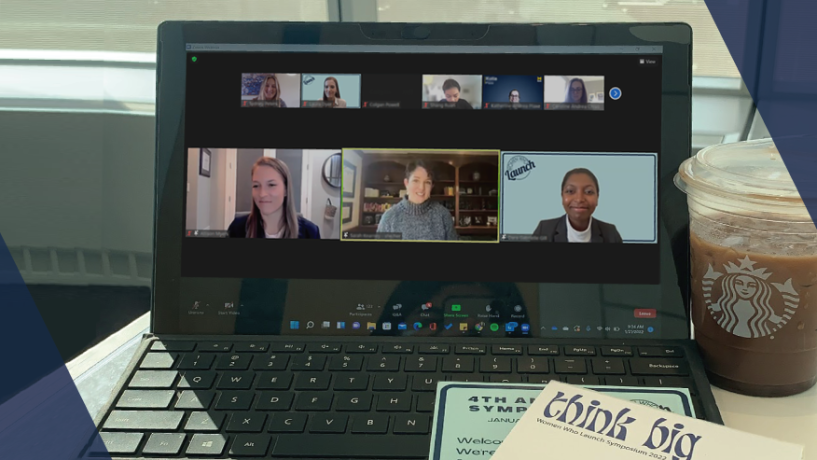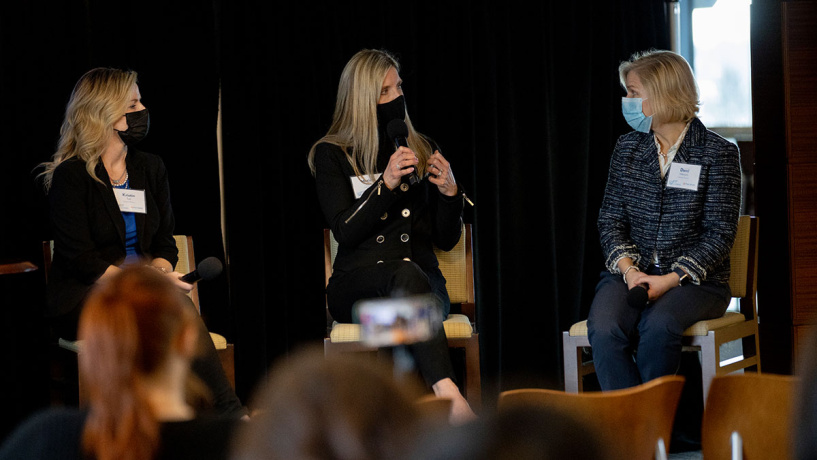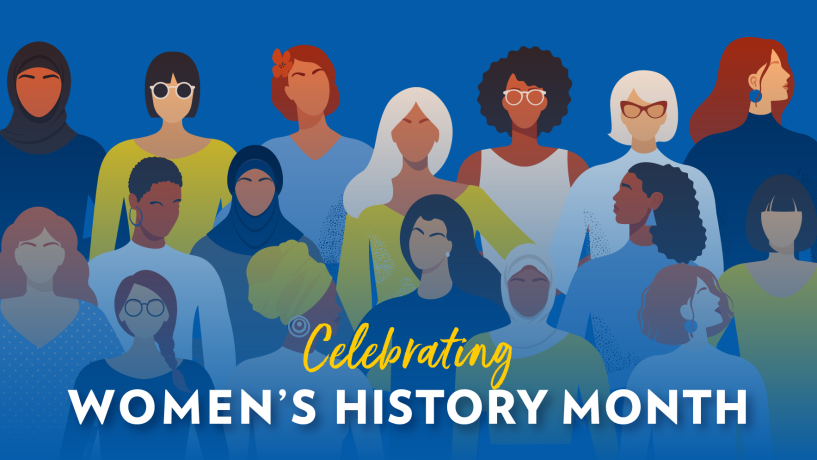Q&A: Celebrating Michigan Ross Women From Around the World for International Women’s Day

On March 8, the world will recognize International Women’s Day, a global celebration of the social, economic, cultural, and political achievements of women. The day also serves as a call to action for accelerating women's equality.
The Ross School of Business has a strong track record of helping empower women to be powerful leaders in business and society. Michigan Ross was recently named the MBA program with the best resources for women; has student organizations dedicated to women, such as Michigan Business Women and Women Who Launch; and organizes many impactful events and programs throughout the year to support women.
Michigan Ross is also home to thousands of inspiring women who are making a difference and achieving great things each day. This year, eight Ross graduate students from around the world shared their thoughts on International Women’s Day, gender equity in business and business school, and advice for prospective Ross women students.
Daniela Caetano
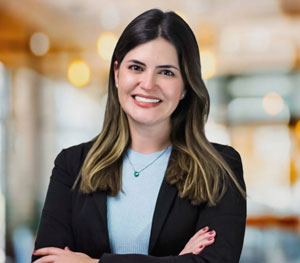 Program/Year: Full-Time MBA ’23
Program/Year: Full-Time MBA ’23
Hometown: Brasilia, Brazil
Post-Graduation Career Interest: Technology
Why is it important to recognize International Women’s Day? How can we better celebrate the amazing contributions of women to our society?
International Women’s Day is a historical landmark in the world's agenda to remind us of the big gender gap that still harms our personal and professional relationships. For far too long, the patriarchal culture has been telling women “know your place,” “you are undervalued,” “you are better off silent.” And many of us still don’t have a safe space to start conversations about such psychological cruelty. For me, International Women’s Day is surely a big occasion to celebrate achievements. But much more than that, it is a day to spread awareness, to support unpleasant discussions, and to encourage commitment with concrete DEI resolutions toward gender inequality.
“Imagine a gender equal world” is part of the campaign theme (#BreakTheBias) of International Women’s Day this year. What does gender equity mean to you, and what does working toward gender equity in the business world and business school environment look like?
I remember my first internship day back in law school in my early 20s. I was asked to observe the superior court’s dress code that obligates women to wear skirts at work. I can still recall the tension I felt when my pen fell on the court’s floor and I couldn’t decide what was worse – pick it up in front of all those men’s eyes or ask one of them to help me out with that, facing the risk of being called “flirty.” Yes, this kind of tradeoff is very different from the ones we hear about at business school (and may even be considered too silly by a few), but it is the kind of experience that women are concerned about in a professional environment. For me, gender equity means not only having the same compensation package or the same chances as men of getting a big promotion; it means being raised knowing that we can run a company if we want to, that we don’t have to prove ourselves to each and everyone around, and that we must not bow to bias. Therefore, an important step for a business environment to better support gender equality is to actively listen to women’s feedback about their experiences with their colleagues and supervisors.
Have you participated in any events or programs at Ross aiming to support or celebrate women business leaders? If so, which ones, and what did you take away from those experiences?
Women Who Launch, Women in Leadership Conference, and many other DEI events are key to pave the way for all self-identified women at Ross to succeed in their journeys. Moreover, even before classes started, Ross paid my attendance costs to engage in a Forté Foundation conference that discussed how to increase female leadership in business environments. It was a once-in-a-lifetime experience for me: Hundreds of women from all over the world, across different generations and backgrounds, sharing the challenges they had faced and how brave they had to be to overcome most of them. I was mind-blown by the fact that regardless of our age and nationalities, we all face the same kind of barriers – and there is still a long way to go to change that. From day one, this opportunity defined the mindset I wanted to bring to business school and reshaped many of the professional goals I had envisioned so far.
Cecilia Chen
 Program/Year: Master of Management ’22
Program/Year: Master of Management ’22
Hometown: Shanghai, China
Post-Graduation Career Interest: Consulting, marketing
“Imagine a gender equal world” is part of the campaign theme (#BreakTheBias) of International Women’s Day this year. What does gender equity mean to you, and what does working toward gender equity in the business world and business school environment look like?
To me, gender equity simply means everyone could make their own choice and pursue their happiness without any restrictions or judgments. We still have a long way to go toward gender equity, and in the business world there are many issues to solve, such as wage disparity. Some elements of a healthy environment include more women sitting in the boardroom and C-suite, representation of powerful women, and acknowledgement of the achievements of women who break through the glass ceiling. It is also nice to see women be ambitious in business school, because ambition is never a dirty word and it actually requires a combination of tenacity, hard work, and dedication.
Have you participated in any events or programs at Ross aiming to support or celebrate women business leaders? If so, which ones, and what did you take away from those experiences?
Yes, I have been participating in events organized by the One Year Master’s Women in Business club. Forming close connections with other women brings many benefits. We share experiences from women who have been there or done that. Together, we can learn from each other, overcome the hurdles of unconscious bias, and rise up into leadership. It also helps to build confidence since our peers are all very supportive and they help you realize your strength.
What advice do you have for women who may be interested in pursuing their graduate degree in business at Ross?
Be brave, be ambitious, and all is possible.
Josephine Cheng
 Program/Year: Full-Time MBA '22
Program/Year: Full-Time MBA '22
Hometown: Taipei, Taiwan
Post-Graduation Career Interest: Consulting
Why is it important to recognize International Women’s Day? How can we better celebrate the amazing contributions of women to our society?
Our community features people's great potential in achieving their goals. International women have our own difficulties to overcome, but we would certainly make it with support. The fantastic contribution of women does not only exist in books or LinkedIn posts, but also around you and me, so let's reach out to your friends and listen to their stories.
Have you participated in any events or programs at Ross aiming to support or celebrate women business leaders? If so, which ones and what did you take away from those experiences?
I was the director of international students for Michigan Business Women, a Ross club committed to supporting diversity. I connected with various women business leaders and allies during the year I served in this role. This experience reshaped my understanding of women role models, so I decided to develop the best me and then contribute back to the community.
What advice do you have for women who may be interested in pursuing their graduate degree in business at Ross?
I hope everyone understands nothing is impossible, though we might not clearly see where we will be. Prior to Ross, I was a young international woman lacking support and confidence, but I knew I had a desire to change my life. With consistent personal effort and support from the Ross community, I transitioned to the places I looked for before I matriculated: management consulting, leadership roles, and an equitable working environment. I really appreciated the Ross community and myself, who never gives up.
Bhumika Das
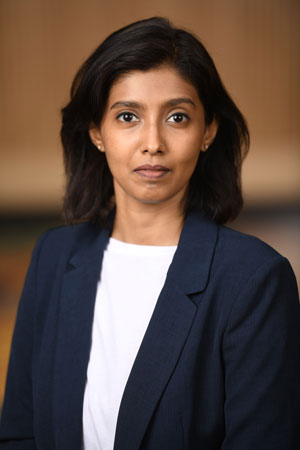 Program/Year: Master of Supply Chain Management ’22
Program/Year: Master of Supply Chain Management ’22
Hometown: Bhubaneswar, India
Post-Graduation Career Interest: Logistics and supply chain
“Imagine a gender-equal world” is part of the campaign theme (#BreakTheBias) of International Women’s Day this year. What does gender equity mean to you, and what does work toward gender equity in the business world and business school environment look like?
First, I would like to talk about equality and equity. Though they sound the same, the difference between them is huge! Equality is more like dividing the resources equally among all and paying little attention to the fairness of desired outcome; while equity requires more foresight and intentional allocation of resources tailored to individual needs to reach the desired outcome.
So, when we talk about gender equity, we are opening ourselves to discuss and pay adequate heed to those enablers which help both men and women achieve the same level of social, economic, and political parity like equal pay, higher education, political representation, legal protection, etc. In the business world, today only 5% of women hold the position of key decision-makers in the Fortune 500 even though women cover approximately 50% of the world’s population. This goes to show how underrepresented they are at the table. The agenda of the #BreakTheBias theme is to dedicate the coming year to work toward calling out these existing biases, stereotypes, and gender inequality, and rejecting discrimination at the workplace as well as at home.
In thinking of #BreaktheBias, what do you think the biggest area to address is as it relates to gender inequity?
This International Women’s Day I want to highlight something that I have seen happen in developing countries a lot. Growing up in a small town in India, I have seen people fight for basic resources to have a simple life. Amid the chaos of life, parents often overlook the right to education for their girl child. Due to lack of awareness, they see education as an extra expense, and more of a luxury, with no significant result for their girls. So, girls are taken out of school from an early age; thus keeping them from their right to education. This might appear as a socioeconomic issue, but if you dig deep, you can see this is due to gender inequality backed by deep-seeded patriarchal values.
When a girl is educated, she is empowered. She can make decisions for herself, raise the standard of living for her family and children, generate more employment options, and reform the society as a whole, thus tackling issues like gender inequality along the way. So, this IWD I would like to address girl child education as the biggest area for improvement and an urgent need of the hour.
What advice do you have for women who may be interested in pursuing their graduate degree in business at Ross?
If you are interested in bringing a large-scale impact into the world and being a part of a close-knit community where women from different countries, age groups, socioeconomic backgrounds, and walks of life are working actively to make this world a better place, Michigan Ross is the school for you. I have been here for a year now, and every day I marvel at the number of strong, independent, inspiring, and driven women that I meet regularly. With Michigan Business Women or OYM Women in Business Club acting as enablers, they can share their experience as a woman in business and learn from the diverse perspectives of their peers.
Manu Mehta
 Program/Year: Weekend MBA ’23
Program/Year: Weekend MBA ’23
Hometown: Mumbai, India
Day Job/title or post-graduation career interest: Solutions architect at Databricks
Why is it important to recognize International Women’s Day? How can we better celebrate the amazing contributions of women to our society?
Women are at the forefront of innovation and are making great strides in propelling society forward. Yet, their achievements and contributions are often overlooked or minimized. International Women’s Day is a great way to celebrate and honor their successes, as well as their failures, and draw attention to the systemic barriers they face in all walks of life. I believe that adopting a women's allyship mindset to support gender inclusiveness proactively rather than reactively, is a great way to celebrate women and their unique stories.
Have you participated in any events or programs at Ross aiming to support or celebrate women business leaders? If so, which ones and what did you take away from those experiences?
Women's resource organizations at Michigan Ross are exceptional. I was particularly impressed by the Sanger Leadership Center's Women in Leadership program. The goal of this program is to teach future female leaders how to repurpose their self-doubt into boldness and confidence as they pursue their professional and personal ambitions. One of the lessons learned from these events was to encourage women to see instances in which they’re not the smartest in the room as potential for advancement and learning from those who are. This simple, yet radical, thinking shift has been life changing.
What advice do you have for women who may be interested in pursuing their graduate degree in business at Ross?
I would advise women to present their authentic selves through their school applications and highlight their unique backgrounds. I would also encourage them to review the women affinity student clubs as well as leadership events at Ross and leverage these initiatives to enhance their Ross experience.
Ross has one of the strongest women’s networks among business schools, making it the best choice for pursuing a graduate degree. Women are encouraged to take on leadership roles, build relationships within a supportive community of peers, and graduate with knowledge and experiences to thrive in their careers.
Irsha Pardeshi
 Program/Year: Online MBA ’24
Program/Year: Online MBA ’24
Hometown: Pune, India
Day Job/title or post-graduation career interest: Consulting
“Imagine a gender equal world” is part of the campaign theme (#BreakTheBias) of International Women’s Day this year. What does gender equity mean to you, and what does working toward gender equity in the business world and business school environment look like?
For me, gender equity means that I have an equal say or opinion or standing in every aspect of life — whether it is at work or in family or in society. In the business world, I would like to see more women take on leadership roles. I believe that working toward gender equity in the business world should not be just limited to providing leadership opportunities to women, but also expanded to encouraging professional women to seek and have a “sponsor” in their careers. I say “sponsor” and not “mentor” because “sponsor” is the one who will and can root for you and your progression in the career hierarchy when you are not in the room. In the business school environment, I would like to see more women candidates enroll and receive the benefits of the fantastic MBA programs just like the ones at Ross.
For me, working toward gender equity in the business school environment would be to promote women's engagement in school activities so that they can gain confidence and leadership skills. I am fortunate and so proud to be part of Ross because Ross offers an excellent platform to learn and grow as a leader.
Have you participated in any events or programs at Ross aiming to support or celebrate women business leaders? If so, which ones, and what did you take away from those experiences?
Yes, during my recent on-campus leadership residency for the Online MBA Program, I had the opportunity to participate in the event titled Leading through Crisis: Expert Insights from General Motors, which was led by women leaders from General Motors. There were two key takeaways for me from this event. One of the key takeaways was that women can confidently lead the team, solve a crisis, and emerge successful. Another key takeaway was that women have a naturally empathetic working style that can help them leverage the strengths of their team members or colleagues to think critically and solve a challenging problem at hand.
What advice do you have for women who may be interested in pursuing their graduate degree in business at Ross?
My advice to women who may be interested in pursuing their graduate degree in business at Ross is “Believe in yourself. Don’t let anything stop you.” I believe in a go-getter attitude. My approach is if faced with challenges, deal with them head-on, overcome them, and march toward your goal. This is exactly what I did to prepare myself for pursuing a business degree. I chose Ross because it offers an excellent online MBA program that is flexible, thorough, intense, action-based, and at the same time, fun. At Ross, I met such great people in a short amount of time who are driven and passionate to grow in their careers. Ross provides an invigorating environment that not just motivates you to strive for the best in your career, but also to grow as an individual both personally and professionally.
Aishwarya Raghunathan
 Program/Year: Online MBA ’24
Program/Year: Online MBA ’24
Hometown: Chennai, India
Day Job/title or post-graduation career interest: Automotive/tech
“Imagine a gender equal world” is part of the campaign theme (#BreakTheBias) of International Women’s Day this year. What does gender equity mean to you, and what does working toward gender equity in the business world and business school environment look like?
Gender equity is a means to level the playing field and achieve equal and fair outcomes for men and women. As a first step, working towards gender equity involves acknowledging that inequities exist in the business world. Thereafter, we need to make efforts to establish a culture that enables women to feel a sense of belonging, provides them access to equal economic opportunities, and eliminates biases that restrict women from being successful in the workplace or school environment.
Have you participated in any events or programs at Ross aiming to support or celebrate women business leaders? If so, which ones, and what did you take away from those experiences?
I’m a member of the Michigan Business Women club at Ross, through which I’ve had opportunities to participate in events and networking sessions with successful women business leaders and learn about their career trajectories. Some of my key takeaways from these experiences are leading with empathy, increased tolerance for uncertainty, importance of stepping out of your comfort zone, and the value of mentorship.
What advice do you have for women who may be interested in pursuing their graduate degree in business at Ross?
My advice would be: “Give yourself a chance; you’d be surprised by your ability to push boundaries.”
Ross is a place that brings together women with diverse backgrounds and experiences. It is an inclusive community that fosters personal growth, learning, and collaboration. A graduate degree in business from Ross will truly prepare you to be a strong business leader.
Minori Suzuki
 Program/Year: Master of Accounting '22
Program/Year: Master of Accounting '22
Hometown: Nagoya, Japan
Post-Graduation Career Interest: Accounting
Why is it important to recognize International Women’s Day? How can we better celebrate the amazing contributions of women to our society?
I believe it is important to recognize International Women’s Day in order to inspire and give hope to women around the world that they are capable of doing something amazing to society. Growing up, I did not see anyone that looked like me on any type of media introducing people with great achievement. So it was difficult for me to imagine myself achieving something that would make the news. Today, women are making great contributions to our society every day. By recognizing that, we can motivate women around the world that if we work hard, we can achieve anything we dream to achieve.
Since this day is celebrated globally, it is important to recognize women from a variety of backgrounds. It is the day to give hope and inspiration to all the women from all different backgrounds from all over the world.
“Imagine a gender equal world” is part of the campaign theme (#BreakTheBias) of International Women’s Day this year. What does gender equity mean to you, and what does working toward gender equity in the business world and business school environment look like?
To me, gender equity means the world where no one is expected to act certain ways based on gender. In my home country, Japan, women are mostly expected to stay home, do household chores, and be a primary carer of kids. I was very disappointed when Japan ranked 120th place out of 156 countries in the Global Gender Gap Report 2021. The world without gender inequity means that those women in Japan, or any parts of the world, can pursue their dream jobs without facing any barriers. The business world and business school should work toward erasing any gender-based assumptions and expectations in order for everyone to achieve their full potential.
What advice do you have for women who may be interested in pursuing their graduate degree in business at Ross?
I believe that being confident is very important. Many courses at Ross require students to work in groups. In group settings, it is sometimes easy for women to lose confidence in their ability and get swayed by others’ ideas or opinions. It is also true that women have to put extra effort into making themselves sound convincing. In those situations, it is very significant that you have confidence in your ideas and let your opinion be heard by your group members. You have to trust yourself and believe that you deserve to be here and your ideas and opinions are always welcomed and appreciated.





